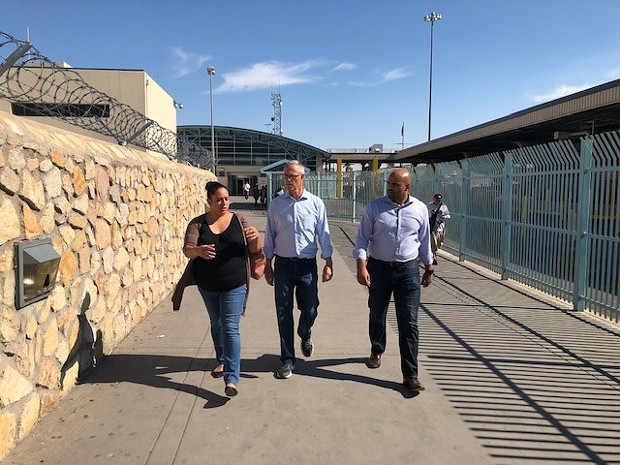[
{
"name": "Top Stories Video Pair",
"insertPoint": "7",
"component": "17087298",
"parentWrapperClass": "fdn-ads-inline-content-block",
"requiredCountToDisplay": "1"
}
]
A beautiful 2-year-old Honduran girl flashed a huge, radiant smile when we walked up to her July 27. Her name is Natalia and she just wanted to play. We were instantly friends and she demanded that I draw a gato for her on papel. When I playfully drew a whale instead, and then a shark, she was unimpressed. "Gato!" OK, OK!
I was joined on this trip by my colleague Representative Colin Allred, a hulking former NFL star who is also a University of California at Berkeley Boalt Hall trained lawyer and very thoughtful freshman member of Congress.
Like me, he was instantly smitten by Natalia. What she and her young mother were doing in the sterile lobby of a state office building in Juarez, Mexico, is a complicated story.
The building is doing double duty as a place to process and protect some of the thousands of asylum seekers who the Trump administration is turning away from the nearby port of entry. Under Trump's cynically named "Migrant Protection Protocols" (MPP), more commonly referred to as the "wait in Mexico" policy, we are doing anything but "protecting" migrants.
Earlier in the day back in El Paso, Texas, U.S. Customs and Border Patrol (CBP) had shown us an adult detention facility for migrants who qualify, because of family connections or special circumstances, to wait in the U.S. while their asylum claims are considered. I've visited plenty of prisons and this was a fairly nice one — clean and not overly crowded. But it was still a prison, complete with high fences, razor wire, jump suits and lace-free shoes on the detainees, all of whom, we can't forget, have committed no crime.
I was determined to make human connections on this trip. I had watched in dismay a few weeks ago as Vice President Mike Pence and some GOP members of Congress did a whirlwind photo op at a border detention facility. They didn't speak to or make eye contact with the people in the cages. They looked everywhere else instead, keeping their emotional distance from the human beings that this is all about.
So, with translation from my excellent immigration staffer, Michelle Garcilazo, Colin and I asked some of the detainees about their experiences. I was struck by the diversity of backgrounds: a Cuban schoolteacher who happened to speak perfect English; several Brazilians and Mexicans; and several people from Central America. We couldn't get into the details of their asylum claims because we didn't want to prejudice them in the presence of an ICE attorney (he raised this concern, to his credit). But all of them assured us they were getting good food and being treated decently.
The only problem they flagged was in the temporary holding room behind them, where a dozen men were isolated pending medical screenings. They weren't allowed blankets in there, we were told. As soon as I pointed the shivering men out to the guard, voila! A bag of blankets appeared and into the holding room they went.
At the infirmary we saw two detainees from India who are 19 days into a hunger strike. They were tiny, frail and motionless under their blankets. I asked if we could talk with them, and we were later allowed to meet one man in a holding cell with his lawyer. Since none of us spoke Punjabi, it was very hard to communicate. But from what we could gather, he and his compatriot had been subject to violent political persecution back in India, including murders of family members. He believes he will be killed if he returns, but our government does not consider political violence in India to be a real thing. The immigration "judge" has told him he doesn't believe his story. Besides, the "judge" said, India is a big country where he can surely hide from his persecutors. Since his asylum claim is likely to be rejected, he has decided he would rather die of starvation in the U.S. than be hacked to death by political enemies in India. So his hunger strike goes on.
Everyone at our ICE detention center was pleasant, from the tour leader to the nurse in the infirmary, the chef in the cafeteria, and even the lawyer for ICE. All of them were Latino. They spoke of their own immigrant backgrounds and their compassion for the detainees. They seemed professional and sincere. But I also had no doubt we were seeing only the people and the parts of the system that ICE/CBP wanted us to see.
I had the same feeling at the child detention facility we visited across town. Run by the nonprofit Southwest Key, this facility houses about 50 unaccompanied minors up to the age of 17. They stay there usually for about three months, but sometimes up to a year, while they are being processed for placement with a family member or foster home somewhere in the US. Once you get through the high security entrance, it feels like a bright and cheery boarding school. We saw kids relaxing, playing video games, doing crafts, and having snacks. They greeted us with smiles and a friendly "hola," but we weren't allowed to interview them — ostensibly because of privacy concerns.
Hundreds of unaccompanied minors just like these kids have been placed in my Northern California district in recent years. We've heard harrowing stories — not so much about the Southwest Key facilities, but about the CBP detention facilities where unaccompanied minors are forced to spend their first few days.
I wanted to ask these kids in El Paso about that; and about how and why they made the perilous journey to America. We weren't allowed to have that conversation. That bothered me. So did the strangely perfect condition of every single bed in the dorm areas, many with bibles neatly opened to a special prayer and placed perfectly in the center of the perfectly placed pillow on their identically and perfectly made beds. I saw nothing but nice people and good conditions in this facility, but it was clear I was seeing the best of what they allowed me to see.
One thing they didn't want me to see: the border detention camps. Our repeated requests to tour those facilities were rejected by CBP. So we went to Juarez to see if we could learn more than what ICE/CBP wanted to show us.
Juarez is poor, dangerous in many parts, and obviously lacking the resources to handle the current wave of migrants that the United States considers to be mostly their problem, not ours. A little over a block from where we met Natalia and her mom, a local government official was shot in the head in broad daylight a few weeks ago. They still don't know why.
We were led into Juarez by Julia, an attorney from the El Paso-based nonprofit Las Americas that represents these migrants in the kangaroo court proceedings that may someday decide their fate. If they can wait a year or more. If they can somehow survive the thieves, predators, criminal traffickers and scammers in Juarez who see their plight as a business opportunity. If they can make their asylum plea to an American "judge" who works for the same agency that is trying to deport them. About 5 percent of those cases are successful.
It's hard to reconcile the dark, harrowing story of how Natalia and her mom got there with the beaming, mischievous grin of a toddler who just wants to play and charm visiting congressmen. I got the details as Michelle translated for us. Through sobs and tears, Natalia's mother told us about the many family members who had been killed by gangs, including her mother and siblings. Some were hacked to death with machetes for simply talking to the police. She made the painful decision to leave her two older boys behind and travel alone with Natalya, on busses mostly but also on foot. That's when two men robbed them of almost everything they had.
When they got to Juarez, like other asylum-seekers they were turned away — told to go to Mexican authorities and essentially take a number. They couldn't wait, so they crossed the largely dry Rio Grande and were apprehended by the Border Patrol.
That's where we get into one of the ugliest parts of the Trump's administration's treatment of migrants like Natalia and her mom: the border detention "camps" they refused to show me. Migrants who cross "irregularly" — because Trump has barred them from legal ports of entry — are forced to stay initially in these camps. It's supposed to last no more than 72 hours. They're supposed to get urgent medical care and basic humanitarian needs met. But as we know from the Inspector General's report, from the U.N. Human Rights Commission and from video that some of my congressional colleagues smuggled out from their recent visits, none of this actually happens.
The camps are a humanitarian disaster. Natalia's mother confirmed the many chilling accounts we've heard about these camps. For an entire week, she and Natalia were crammed into a large pen with about 25 other mothers and 25 young children. A single toilet, open for all to see. No beds. Concrete floors. Thin plastic "blankets." Bright lights on all night long. The 43 stiches in her head from a recent car accident and her very young child were deemed insufficiently compelling circumstances for her to be sent to a family detention center in the U.S. to await processing of her asylum claim. Instead, because she had crossed "irregularly" instead of getting a number from Mexican authorities, Natalia and her mom were dumped in Juarez and told to go to the back of the line. That's where they were when we met them.
If they can figure out a way to wait in Juarez for the next year, they will have an opportunity to roll the dice with an asylum "judge" in an immigration court system that operates under political directives and quotas handed down from the very top of the Trump administration.
Rep. Allred and I spent a couple of hours in El Paso meeting with nonprofit groups and advocates who told us story after story about the unprofessionalism and bias of these administrative law judges. This, in conjunction with the MPP policy, the horrific conditions in CBP border detention camps, and the chaos and criminality in Juarez have dramatically transformed an asylum system that was intended to welcome desperate migrants fleeing violence, war and persecution in their home countries.
At this point, Natalia's mom was crying inconsolably as she talked of giving up, going back to Honduras and probably being killed. President Trump's only coherent immigration policy — brutal deterrence — was having the intended effect.
Jared Huffman is a member of U.S. House of Representatives who has represented the North Coast since 2013. This piece first appeared on his Facebook page July 28.
Speaking of...
-

Huffman, Haaland to Visit Humboldt Bay Amid Growing Tribal Offshore Wind Opposition
Mar 26, 2024 -

Final Election Night Report Leaves Races Unchanged: Incumbents Lead Supes Contests, Van Dyke Ahead for Judgeship
Mar 5, 2024 -

Salmon Season Closure: Huffman, Pelosi Pledge to Work to Fast Track Federal Aid, Cite Need for Long-Term Solutions
Apr 7, 2023 - More »
more from the author
-
'A Slippery Slope to Theocracy'
- Nov 2, 2023
- More »
Latest in Views
Readers also liked…
-
Hope
- Sep 7, 2023
-
California Says No to Privatizing Medicare
- Sep 21, 2023
































